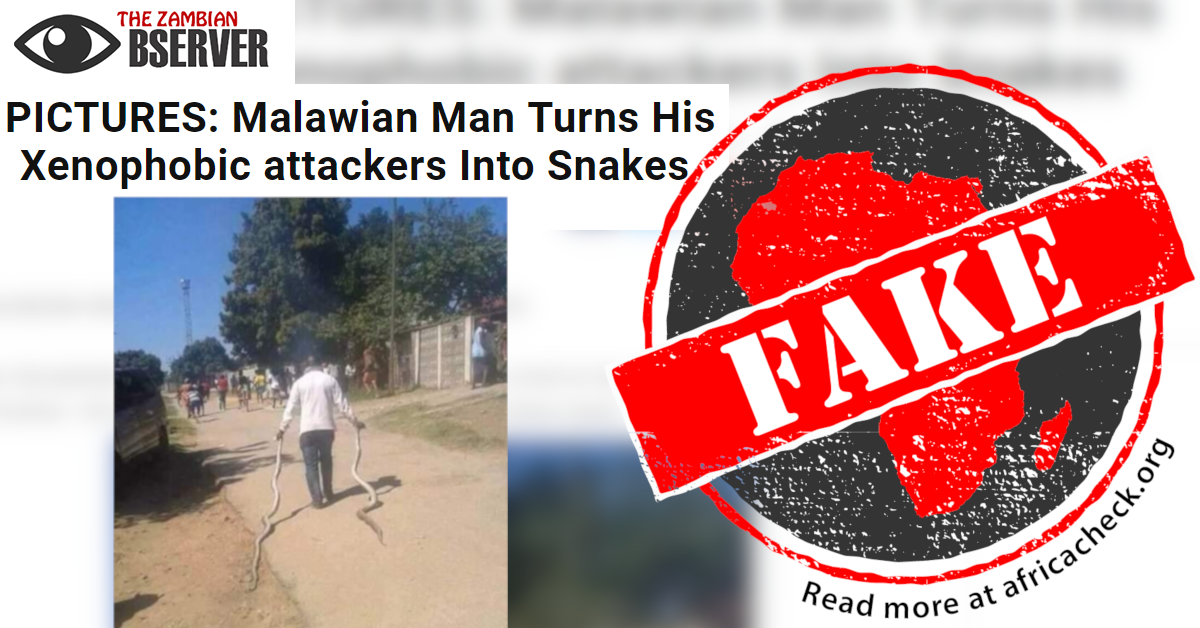In March and April 2019 xenophobia in South Africa was again in the news with attacks on foreign nationals living in KwaZulu-Natal province. At least two people died and many migrants were left homeless.
Soon after, the known fake news site Zambian Observer published an article headlined “Malawian man turns his xenophobic attackers into snakes”. It shows a photo of a man dragging two large snakes down a dusty road.
“Two xenophobic attackers turn into snakes after they tried to burn a Malawian man’s house in Durban,” it says. “He’s now demanding R200,000 to change them back.”
The story and photo were then posted on the News24 Zambia Facebook page, racking up more than 8,200 shares. A video with the same claim was posted by Zambian page Chililabombwe Inside News.

But the photo and video are two years old, and taken in South Africa’s neighbour, Zimbabwe.
A search for the photo on TinEye took us to an article published on the Zimbabwean news site iHarare in May 2017.
Headlined “Horror in Mabvuku”, it says a man was seen carrying two snakes in Mabvuku, a township east of Harare in Zimbabwe. It does not mention any people being turned into snakes.
Other photos in the article show cars with Zimbabwean registration plates. A Zimbabwean flag is hanging in one of the cars.
A video of the incident was loaded on the iHarare YouTube channel on 7 May 2017. The video posted on Facebook is also on YouTube, titled “Mabvuku man seen with two big snakes” and dated 8 May 2017.
The evidence shows that the photo and video are of a man in Zimbabwe, not a Malawian migrant in South Africa. There is no evidence of xenophobic attackers being turned into snakes in Durban.
And any outrageous story published by the Zambian Observer needs to be taken with a pinch of salt.
Africa Check has researched three different articles published on the site, and rated two as false and one as an outright fake. This story is also fake. – Africa Check
Soon after, the known fake news site Zambian Observer published an article headlined “Malawian man turns his xenophobic attackers into snakes”. It shows a photo of a man dragging two large snakes down a dusty road.
“Two xenophobic attackers turn into snakes after they tried to burn a Malawian man’s house in Durban,” it says. “He’s now demanding R200,000 to change them back.”
The story and photo were then posted on the News24 Zambia Facebook page, racking up more than 8,200 shares. A video with the same claim was posted by Zambian page Chililabombwe Inside News.

Photo and video from Zimbabwe, not South Africa
But the photo and video are two years old, and taken in South Africa’s neighbour, Zimbabwe.
A search for the photo on TinEye took us to an article published on the Zimbabwean news site iHarare in May 2017.
Headlined “Horror in Mabvuku”, it says a man was seen carrying two snakes in Mabvuku, a township east of Harare in Zimbabwe. It does not mention any people being turned into snakes.
Other photos in the article show cars with Zimbabwean registration plates. A Zimbabwean flag is hanging in one of the cars.
A video of the incident was loaded on the iHarare YouTube channel on 7 May 2017. The video posted on Facebook is also on YouTube, titled “Mabvuku man seen with two big snakes” and dated 8 May 2017.
No evidence for made-up story
The evidence shows that the photo and video are of a man in Zimbabwe, not a Malawian migrant in South Africa. There is no evidence of xenophobic attackers being turned into snakes in Durban.
And any outrageous story published by the Zambian Observer needs to be taken with a pinch of salt.
Africa Check has researched three different articles published on the site, and rated two as false and one as an outright fake. This story is also fake. – Africa Check
Republish our content for free
For publishers: what to do if your post is rated false
A fact-checker has rated your Facebook or Instagram post as “false”, “altered”, “partly false” or “missing context”. This could have serious consequences. What do you do?
Click on our guide for the steps you should follow.
Publishers guideAfrica Check teams up with Facebook
Africa Check is a partner in Meta's third-party fact-checking programme to help stop the spread of false information on social media.
The content we rate as “false” will be downgraded on Facebook and Instagram. This means fewer people will see it.
You can also help identify false information on Facebook. This guide explains how.



Add new comment